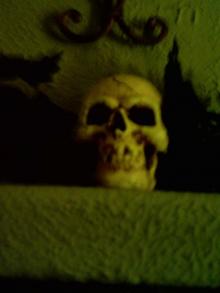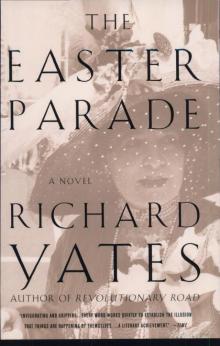- Home
- Richard Yates
Young Hearts Crying Page 10
Young Hearts Crying Read online
Page 10
Something would have to be said. Well, I’m afraid I don’t care much for bowling, Harold, he might begin, and I never really learned to play poker; but I like to watch the fights – do you? Oh, the girls probably wouldn’t go for it, but maybe you and I could get together in whatever bar you like, some night when there’s a good fight card coming up, and we could –
Wrong; wrong. Harold Smith might say Nah, I don’t follow the fights, or Nah, I don’t go to bars; or worse, he might say Yeah? I wouldn’t of figured you for a fight fan – and that would only lead to one more treacherous stroll down the dust of Memory Lane, to Blanchard Field or even to the unmentionable Golden Gloves.
At last, and in what seemed the nick of time, Michael let his voice start to work without any thought or plan of what he was saying.
“Harold?” he inquired. “Why don’t you and Nancy come over to the house for supper some night soon? Or if you can’t make it for supper, come a little later and we’ll just have a drink and get acquainted. Because I mean as long as we’re neighbors, the least we can do is be friends, right?”
“Well, that’d be very nice, Mike. Thanks.” And for just a second Harold Smith’s plain, pleased-looking face, blushing very slightly, seemed to hint at what Ann Blake had called his natural gift for comedy.
As easy as that! When both of their newspapers had rattled open, suggesting an agreeable separateness for the rest of the ride, Michael couldn’t get over his discovery that sometimes – and maybe only once in a while – social life wasn’t infernally difficult after all.
On the appointed evening the Smiths used a strong flashlight to find their way across the grass to the guest house.
Harold had changed into his country clothes, a heavy red-and-black-checked hunting shirt with the collar up and the tails out; Nancy looked very trim in a blue sweater and well-faded blue jeans. And the Davenports had made the mistake of dressing up for them – Michael in a suit and tie, Lucy in what might easily have been called a cocktail dress. But Michael was fairly sure that if there could now be talk enough, and drink enough, the question of clothes would no longer matter.
Well, sure, working for the railroad was a pain in the ass, Harold Smith confided, settling back in an easy chair with a gin and tonic in his hand. He hadn’t much liked it when he was hired there as an office boy, years ago, and he couldn’t honestly claim he liked it much better now. “My father said ‘Better get a job, kid,’ so I got a job, and there you have the story of my career.” And he took a drink to allow time for a ripple of laughter around the room.
“Still,” he went on, “there were certain unexpected advantages right from the start. My first summer on the job I went stumbling into the personnel department one morning and I spotted old skinny here.” He winked at his wife. “She was sitting at her typewriter like all the other girls, but she wasn’t typing: she had both arms up over her head and she was yawning – she looked like this was the last place in the whole world she wanted to be – and I remember thinking There’s a girl I might be able to talk to. But I was very shy then, you see. Oh, a smart-ass and a wise guy, and I’d been in the Navy and all that, but still very shy with girls.”
“So you had an office romance,” Lucy Davenport said. “Oh, this is a charming story.” And Michael was instantly afraid that “charming” might have a patronizing sound.
“Well, it sure as hell didn’t happen right away,” Harold said. “I took to walking into personnel three and four times a day, whether I had any business there or not – sometimes all I’d do would be bring in a handful of paper clips – and it must’ve been three weeks before I worked up the nerve to say anything to her.”
“It was more like six,” Nancy Smith said, winning another small laugh. “And all that time I kept wondering Why does this attractive boy keep coming in here, and why doesn’t he ever speak to me?”
“Now, hold it right there, funny-face,” Harold commanded, aiming a stiff index finger at her. “Who’s telling this charming story – you or me?”
And when he was confident of having the floor again, he resumed his own version. “Now, back in those years, you see, they only gave us half an hour for lunch. You were supposed to run around the corner to the Automat, plug in your nickels, eat your sandwich and your lousy little piece a pie, and then come running back to the office like a rat. In other words, I knew there wouldn’t be a hell of a lot of percentage in asking her out to lunch, you follow me? So I got a better idea. I said ‘Look, it’s a beautiful day. Feel like going for a walk?’ And we walked up Park Avenue all the way from Forty-sixth to Fifty-ninth, taking our time, talking and talking. Couple of times she said ‘Harold, we’ll be fired,’ and I’d say ‘Wanna bet?’ And she’d just laugh. Because, you see, in the kind of kids’ jobs we had then we both knew it’d cost the company more to fire us than to keep us on – and besides, all we’d done was disappear for the afternoon: maybe nobody even noticed it. So anyway, we finally did have lunch about four o’clock that day in the Central Park cafeteria, the one by the zoo, but I don’t think either of us ate much: we were too busy holding hands and smooching and saying all kinds of dopey things to each other – stuff we’d both learned from the movies, I guess.”
“Oh, I think that’s beautiful,” Lucy said.
“Well, okay, but we ran into quite a lot of trouble later on,” Harold said. “My family’s Catholic, you see, and Nancy’s is Lutheran, and those two don’t mix at all. And then her parents thought she ought to marry some better-established guy – that was another shitty little problem. Took us more than a year to talk everybody into it, but they finally came around.”
For a tense moment Michael was afraid the Smiths might now ask to hear the story of the Davenports’ courtship, which would involve an awkward slurring-over or throwing-away of words like “college,” let alone of names like “Harvard” and “Radcliffe,” but Harold seemed to feel that any such inquiry could wait. He was well into his second drink, he had grown accustomed to dominating the talk, and now he brought it back to what he had apparently wanted to tell about from the start, which was his ambition.
Even in a rinky-dink old company like the Central, he said, you had to give credit where credit was due. This deal of the free commutation fares, for instance: wasn’t that a pretty fair example of enlightened management at work? How else could he and Nancy ever have been able to raise their kids in a place like this, while they were all still young enough to get the good out of it? And hell, he had to admit he liked the guys he worked with in Data Processing. They’d been together a long time; they understood each other. And there was a men’s handball club that met on Friday afternoons; he’d found he really enjoyed that. Kept him in shape, too.
But the best thing, he said, sitting back with a fresh drink, the most promising thing, was that the Central had now made an executive training program available to its higher-level data processing people. He himself might not be eligible for another two years, but it certainly gave him something to look forward to. Part of the course work was done “within the corporate structure,” he explained, but the biggest share of it was undertaken by “business-administration professors at several of the leading universities in the metropolitan area.…”
All three of Harold’s listeners, whose eyes had been quick and bright when he’d told of taking Nancy out for a walk, had subsided now into attitudes of stoic patience. Nancy looked as though she wasn’t listening because she’d heard it all before; Lucy managed to award the speaker a dumb-faced little nod at each pause in his voice, to show she was following the points he made; Michael stared down into his glass as if alcohol, taken in reasonable quantities, might turn out to be an effective precaution against dying of boredom.
But at last Harold came forward in his chair in a way that suggested he was almost finished. “So you see,” he said, “in the transportation industry of the future it won’t matter whether a man’s come up through the rails or the airlines. He’ll be a member of responsible, decision-ma
king management in the – you know – in the transportation industry itself.”
“Well, that’s certainly very – interesting,” Lucy said.
“You’re right,” he told her. “It’s interesting. And I’m very interested in your field, too, Mike.”
“My field?”
“Chain Store Age. Because I mean Jesus, talk about changes. Only a few years ago you had your little neighborhood grocery and your little drugstore and your little guy around the corner selling fish. And now there’s a revolution in the entire concept of retail merchandising, am I right? So you take a magazine like yours, right up at the forefront of all those changes; I’d think you must find yourself in a world of opportunity every time you walk into the office.”
“Well, no, Harold,” Michael said. “I don’t think of it as anything but a way of paying the bills, you see, so I can get my own stuff done.”
“Well, sure, I understand that, but you still work for the magazine, right? What was the last thing you wrote for them? I’d really like to know.”
Michael set his bite and felt a prickling in his scalp. All this would be over soon. “Well, let’s see,” he said. “I wrote a series of articles about some guy in Delaware named Klapp. He’s an architect who’s built a shopping-mall kind of thing in some town down there and he thinks it’s really swell and he wants to do the same thing in other towns, but he says he keeps being stymied by ‘politics.’ ”
“Did you meet the guy?”
“Talked to him on the phone a couple of times. He sounds like an asshole. The only reason my editor wanted these pieces at all is because the magazine’s planning a special issue on Urban Renewal, or some horseshit like that.”
“Well, okay,” Harold Smith said. “Now. Supposing your articles really do make this guy look good. Then supposing Life magazine picks up the story for a big picture spread, and the guy makes a fortune building his stuff in a whole lot of other towns. And supposing he’s so grateful to you he says ‘Mike, I’d like you to come and be my public-relations man.’ Well, sure, he’d still be an asshole; agreed. But look” – and Harold’s face crinkled, winking, in the way it must have done when he first worked up the nerve to speak to Nancy in the personnel department – “Wouldn’t it be a little nicer to write your poems and your plays on fifty thousand a year?
When the Smiths had followed the efficient beam of their flashlight home at last, Lucy said “Well, now that we’ve made the gesture I don’t imagine we’ll have to do it again, at least for a while.” Then she said “It’s funny, you know? You can see how he would be good in a stage comedy: he can make you laugh. But my God, when he doesn’t feel like making you laugh he can really put you to sleep.”
“Yeah, well, that’s what years of grubbing along in white-collar work can do. It’s not too bad until they start believing in Management, but then they’re lost. The magazine is crawling with people like that too. Sort of frightening.”
She had collected the empty glasses and was carrying them to the kitchen. “Why ‘frightening’?” she asked.
And he was just tired enough, with just enough drink in him, to express and even exaggerate his fears. “Well, because what if this play doesn’t turn out to be my big-assed breakthrough? Or the next play either?”
She was standing at the sink, washing out the glasses and the plate that had held crackers and cheese. “In the first place,” she said, “that’s unlikely, as you know. In the second place you’ll have two or even three good collections of poems soon, and you’ll be sought-after by universities.”
“Yeah, well, swell. Only, you know something? The college English departments of America are loaded with guys an awful lot like Harold Smith. They may not believe in Management, but the things they do believe in are enough to make your eyeballs dry out and wrinkle up like prunes. If I ever turn into a college English teacher I can guarantee you’ll be bored shitless with me inside of two years.”
She made no reply to that, and the silence in the kitchen began to feel almost like shame. He knew what she had left unsaid: In the third place, there would always be her money. And he was appalled now that the fretful aftermath of this one dull evening could have brought him so close to making her say it again.
He moved up beside her and ran one hand down the straight, firm length of her spine. “Well, okay, dear,” he said. “Let’s just go on upstairs now.”
He didn’t finish his play by the end of the year. All through the late winter months he worked day and night in the pump shed, where the kerosene stove left a fine coating of soot on his hands and face and clothes. By March or April, when he could stop using the stove and open the windows, he thought he had made enough good changes in the second and third acts to bring them alive, but the first act still lay inert on its pages. It was all labored exposition, the kind of writing he could have sworn he’d outgrown years ago, and it stubbornly resisted improvement. If the mark of a professional was to make difficult things look easy, this playwright seemed to be straining in the opposite direction: every new device he tried in that wretched first act had the effect of making easy things look difficult.
Then it was the middle of July, and his only encouragement came from knowing he could literally lose himself in concentration for many hours at a time. He didn’t feel the heat or the strict confinement; he wasn’t aware of the pencil in his hand or the dribbling sweat that constantly had to be wiped from his eyes; sometimes he would emerge from the shed at dusk when he’d expected it to be noon.
He was so hard at work one sweltering afternoon that he scarcely noticed a heavy thump shuddering the door of the shed from the outside, as if a man had fallen against the base of it. And half an hour must have passed before he began to realize that the shed itself was filling with a foul, intolerable smell. What the hell was this? He had to struggle to push the door open because of what proved to be a damp hundred-pound burlap sack, and when the sack fell over and came open it spilled many soft, trowel-shaped objects that couldn’t be identified at first because each of them was swarming with blue-bottle flies. Then he saw they were the rotting heads of fish.
“Oh!” Ben Duane called from fifty yards away, and he came hurrying toward the shed in his scanty khaki shorts. He was a little bow-legged but very agile for an old man, and he smiled engagingly. “Didn’t know anyone was in there,” he said, “or I would’ve put that somewhere else.”
“Yeah, well, I work here, you see, Mr. Duane,” Michael said. “I’ve been working here for several years now. Every day.”
“Is that a fact? Funny I hadn’t noticed. Here, I’ll get all this out of your way.” Squatting low, he used both hands to gather up the spilled fish heads, flies and all, and put them back in the sack. “These are mackerel heads,” he explained. “Don’t smell very nice at this stage, but they make good fertilizer.” Then he stood erect again, still smiling, heaved and slung the sack over one naked shoulder, and said “Well. Sorry about the inconvenience, my friend.” And he walked off toward the flower beds.
There was no hope of getting any more work done that day. The mackerel heads were gone but their smell hung as heavy as if it had seeped into the very walls of the shed, and whenever Michael let his eyelids close he saw crawling clots of blue-bottle flies.
“And you know something?” he demanded of Lucy later. “I’ll bet the old son of a bitch did it to me on purpose.”
“Oh?” she said. “Well, but why would he do that?”
“Ah, I don’t know; fuck it. I don’t know anything anymore.”
Chapter Seven
Michael’s parents drove up from Morristown about once a year, and they were model visitors: they never stayed too long or too short a time for comfort; they didn’t seem to find anything strange about the Tonapac place as compared with the house in Larchmont, and they didn’t ask embarrassing questions. It was always clear that their main purpose in making the trip was to see their grandchild, and Laura seemed to love them both wholeheartedly.
But Lucy�
��s parents were far less reliable. Two or three years could pass without a word from them, except for scribbled-up Christmas cards and perhaps some small remembrance at the time of Laura’s birthday; then, and never with adequate notice, they would suddenly appear in the flesh – two handsome, talkative rich people whose every glance and gesture seemed a calculated unkindness.
“So this is where you’ve been hiding,” Charlotte Blaine called as she stepped from a very long, clean automobile. Then, pausing on the lawn to look the place over, she said “Well, it’s – different, isn’t it.” And just before they went into the house she said “I love your little spiral staircase, dear, but I don’t quite see what it’s for.”
“It’s a conversation piece,” Lucy told her.
Michael thought his father-in-law looked a lot older than the last time he’d seen him. Stewart (“Whizzer”) Blaine might still play a fast game of squash in town and a fast game of tennis in the country; he might still dive from the high board and accomplish any number of vigorous laps in the pool; but his face had taken on the bewildered look of a man who can’t imagine where the years have gone.
He was reported to have told Lucy, once, that he thought Michael’s refusal of her fortune was “commendable”; now, though, as he sat blinking over the rim of his bourbon and water, he was almost visibly changing his mind.
“Well, Michael,” he said after a long silence. “How’re things down at the retail whaddyacallit – the trade journal?”
And it was Lucy who answered him, with a casual little smile that warmed Michael’s heart.
“Oh, we’ve almost forgotten all about that,” she said. And she explained about Michael’s free-lance arrangement, making it sound as though he scarcely needed to bother with Chain Store Age from one month to the next. Then she wound it up, after a significant pause, by saying “And he has another book of poems almost finished.”

 The Collected Stories
The Collected Stories A Special Providence
A Special Providence Young Hearts Crying
Young Hearts Crying Easter Parade
Easter Parade A Good School
A Good School Cold Spring Harbor
Cold Spring Harbor Eleven Kinds of Loneliness
Eleven Kinds of Loneliness Disturbing the Peace
Disturbing the Peace Liars in Love
Liars in Love The Collected Stories of Richard Yates
The Collected Stories of Richard Yates Night Noises
Night Noises Disturbing the Peace (Vintage Classics)
Disturbing the Peace (Vintage Classics) The Easter Parade
The Easter Parade